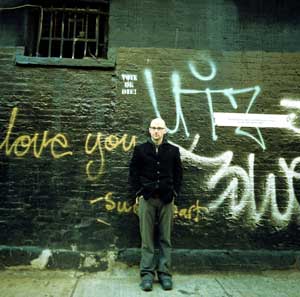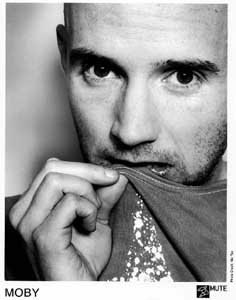-
- Report: Connecticut could lose $1 million a year if civil unions are allowed
- Video that raised conservatives’ ire to be distributed nationwide
- Gay-rights advocates file brief against 1913 Massachusetts law
- Washington Supreme Court hears same-sex marriage case
- Supreme Court to decide gay parenting case
- Gay couple sues for use of their photo in Internet ad
- National News Briefs
- World News Briefs
Arts & Entertainment
Late night ‘Hotel’: an interview with Moby
Published Thursday, 17-Mar-2005 in issue 899
Moby has checked into our consciousness as the release date for his latest album, the double-disc set Hotel (V2), is about to be released. For example, “Beautiful” is the theme song for the new WB reality series “The Starlet,” in which Faye Dunaway is one of the expert panelists. It’s likely “Beautiful” won’t be the only song from Hotel to receive attention. There is the bare bones ballad version of New Order’s “Temptation,” the uplifting dance energy of “Lift Me Up” and the obsessive love of “Where You End,” to recall a few. Anyone looking for music to soothe their troubled mind also need look no further than the ambient tracks found here. Moby was kind enough to stay up late for the transatlantic phone call that resulted in the interview you are about to read.
Gay & Lesbian Times: Disc one of Hotel is bracketed by ambient instrumentals (“Hotel Intro” at the beginning and “Homeward Angel” at the end). Plus the second disc, Hotel Ambient, is 11 tracks of atmospheric instrumentals. Do you feel pulled to move in a more ambient-oriented direction?
Moby: I like a lot of different types of music and that’s kind of why I make eclectic records. It would be very difficult for me to limit myself to just one type of music.
GLT: I’m glad that you mentioned that you like a variety of musical styles, because in the vocals, the guitars and also the lyrics, there is the bluesy quality to “Raining Again” that is familiar from some of your past blues-inspired tracks. How much would you say you are influenced by the blues?
M: I don’t work from any specific influences. At the end of the day, all I’m trying to do is make music that I love and hopefully in the process make music that other people will love as well.
GLT: One of the things that I, and I’m sure others, will love is the cover of New Order’s “Temptation.” I’m always excited to hear what a songwriter chooses to cover on an album and I’m wondering why you selected that song?
M: I own a little restaurant in New York called Teany. And one day I was in Teany and New Order’s Greatest Hits was playing. I hadn’t heard “Temptation,” honestly, in about 15 years. I was struck by how romantic and vulnerable the lyrics were, so I thought it might be interesting to do a version of it that emphasized the romantic, vulnerable qualities of the song.
GLT: I’m glad that you mentioned Teany. Do you have music playing there?
M: Yeah, music is pretty much on whenever we’re open. Music is a very important part of Teany.
GLT: Are you involved in selecting the playlist for what is on in the café?
M: Not at all. My friend Kelly (Tisdale), who runs the restaurant, she basically picks out all of the music.
GLT: Back to New Order for a moment. As an artist whose work blurs the lines between electronic and rock, would you say that New Order, a band that is known for doing the same thing that you are doing, had an influence on your work?
M: That’s the music that I grew up with. There were a lot of rock bands that made dance music and a lot of dance bands who made rock music. It was just a very open time. You would go to nightclubs in the early ‘80s and you’d hear disco and hip-hop and punk rock and reggae all mixed up with each other. That sort of eclectic, hybridized approach to music has definitely influenced the way I approach music now.
GLT: You can definitely hear that. Laura Dawn can be heard singing the lead on “Temptation,” “Very” and a couple of others and she also provides backing vocals on a few other songs. What can you tell me about your collaboration with Laura?
M: Laura’s a good friend of mine and her husband is one of my best friends. Laura used to sing in an all-girl punk rock band in New York called Fluffer. We met because Fluffer used to rehearse in my building. The reason that I wanted her to sing on the record is because we’re friends and she has a beautiful voice. We also work on political stuff together. She’s the creative director of moveon.org.
GLT: As expected, Hotel also has its share of dance-oriented tracks, including “Lift Me Up” and “Very.” What do you think of the current state of dance music?
M: It depends on what you mean by dance music. I guess I have a broad definition of what dance music is. From my perspective, The White Stripes are dance music and The Bravery are dance music. Dance music, to me, is any type of music that you can play in a bar or a nightclub that makes people dance. I don’t have a very strict definition of what dance music is.
GLT: You mentioned The Bravery and I was wondering if you feel a sense of pride in the burgeoning electro movement?
M: My background is very strange. From the time I was 9 until I was 14, I played classical music and then I played guitar in punk rock and new wave bands. I love electronic music, but I don’t think of myself as an electronic musician. Most of the instruments on my records are fairly conventional. There are drums and guitars and keyboards and bass. My allegiance is not to any one style or genre of music, my allegiance is to the power of music to affect people’s lives.
GLT: Hotel is being released initially as limited edition double-disc set, and then later as two separate discs. What is the logic behind that?
M: That was sort of a record company decision. I made it as a double. The music business is in a very strange place right now. I guess the record company thought that it would be smarter to release it as a limited edition double CD and then put the two CDs out separately.
GLT: You mentioned the very strange place in which the music business finds itself and one of the trends is that CDs are selling well in places you wouldn’t expect, such as Starbucks. Will there be a place for Hotel on the counter at Teany?
M: No. When we opened Teany, we very intentionally wanted to have it stand on its own and not be a celebrity restaurant. My music never gets played in Teany. There is almost no evidence that I’m actually one of the owners. I think it’s safe to say that probably a majority of the people who go into Teany don’t even know that I’m involved in it, apart from the fact that I’m there every day. I don’t think that we’ll be selling Hotel in Teany.
GLT: In addition to the music industry being in flux, the country itself is going through a very difficult period, especially under the current regime. Do you feel like your music is one of the ways in which you can effect change?
M: I’m very involved in the world of politics, but the music I make is not particularly political. I’m making music for people to listen to if they’re going for a long drive in their car or if they’re home lying on the couch on a Saturday afternoon. I’m not trying to make political music. I’m much more interested in reaching people on an emotional level than on a political level, at least musically.
GLT: If someone was looking for a Moby song to play during a same-sex marriage ceremony, is there any that you might suggest for that purpose?
M: There are a couple of very romantic songs on Hotel. I would probably choose either “Forever,” which is quite romantic, or there’s another song called “Love Should.” They’re both very romantic songs and I think they would work really well in that situation.
GLT: If you had a hotel, would you leave mints on the pillows or would you leave some other treat?
M: I never understood the practice of leaving mints on the pillow.
GLT: I’m always afraid of squishing them.
M: I’m also afraid of squishing them, and if they melt it could be very messy. Also, you’re not supposed to eat mints before you go to bed. You’re supposed to brush your teeth. I don’t know. I think I’d be more tempted to leave toothbrushes on the pillows (laughs).
|
|
Copyright © 2003-2025 Uptown Publications



